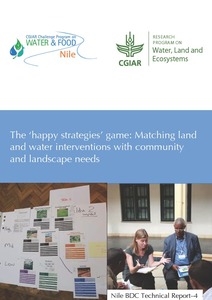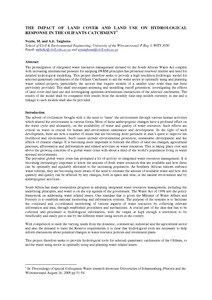Technologies for sustainable forest management: challenges for the 21st century. Commonwealth Forestry Congress, Victoria Falls, Zimbabwe, May 1997
Technology will help to address the challenges for sustainable forestry in the 21st century. Some of the challenges will include the shift of production from native forest to plantations in areas of comparative advantage, more efficient processing delinking end-use products from raw wood characteristics, increased demand, better information technologies to support decision makers, and more options for conserving biodiversity.
The CGIAR research program on water, land and ecosystems (WLE)
The CGIAR Research Program on Water, Land and Ecosystems (WLE) combines the resources of 11 CGIAR centers and numerous international, regional and national partners to provide an integrated approach to natural resource management research. This program is led by the International Water Management Institute (IWMI). This presentation provides an overview of the thematic areas that the research is categorized into as well as the focal regions where we work.
The Evolving Farming and Pastoral Landscapes in Ethiopia: A Farming System Framework for Investment Planning and Priority Setting
The domestic market for small-scale chainsaw milling in Cameroon: present situation, opportunities and challenges
In 1994 Cameroon adopted a new forest law that focussed on the large-scale, export-oriented industrial forest sector while timber produced through small-scale logging for the domestic market was ignored, even in official statistics, and is generally produced without a valid permit. As Cameroon prepares to implement the Voluntary Partnership Agreement (VPA) it recently signed with the European Union, promising a legal framework for all national timber production, this occasional paper presents a quantitative and qualitative evaluation of the country’s domestic timber market.
The evolution of swidden fallow secondary forests in Asia
Swidden agriculture in tropical Asia is a diverse practice, making it difficult to draw general conclusions on trends of the development of swidden fallow secondary forests (SFSF). There is, however, sufficient evidence to recognise trends of a gradual intensification often through the incorporation of extensive tree crop production in SFSF, or a direct conversion to intensive tree cash cropping. Factors contributing to the changes include emerging markets for cash crops or timber and pulp wood production, government policies and development projects, fire, and population pressures.
La genèse des politiques publiques foncières comme mode d’action de l’État ougandais sous le leadership de Y. Museveni
The impact of government policies on land use in northern Vietnam: an institutional approach for understanding farmer decisions
This report identifies the driving forces for reforestation in three villages of Northern Vietnam. Using an institutional analysis focused on the rules governing upland access and use, the authors assess the relative impact of state policies (reforestation programs and forestland allocation) on land use change. Findings show that the latter are indirectly responsible for reforestation, but not because of the incentives they provided. Instead, they disrupted the local rules governing annual crop cultivation and grazing activities leading to the end of annual cropping.
The impact of land cover and land use on hydrological response in the Olifants Catchment
The role of biochar in ameliorating disturbed soils and sequestering soil carbon in tropical agricultural production systems
Agricultural soils in the tropics have undergone significant declines in their native carbon stock through the long-term use of extractive farming practices. However, these soils have significant capacity to sequester CO2 through the implementation of improved land management practices. This paper reviews the published and grey literature related to the influence of improved land management practices on soil carbon stock in the tropics.




